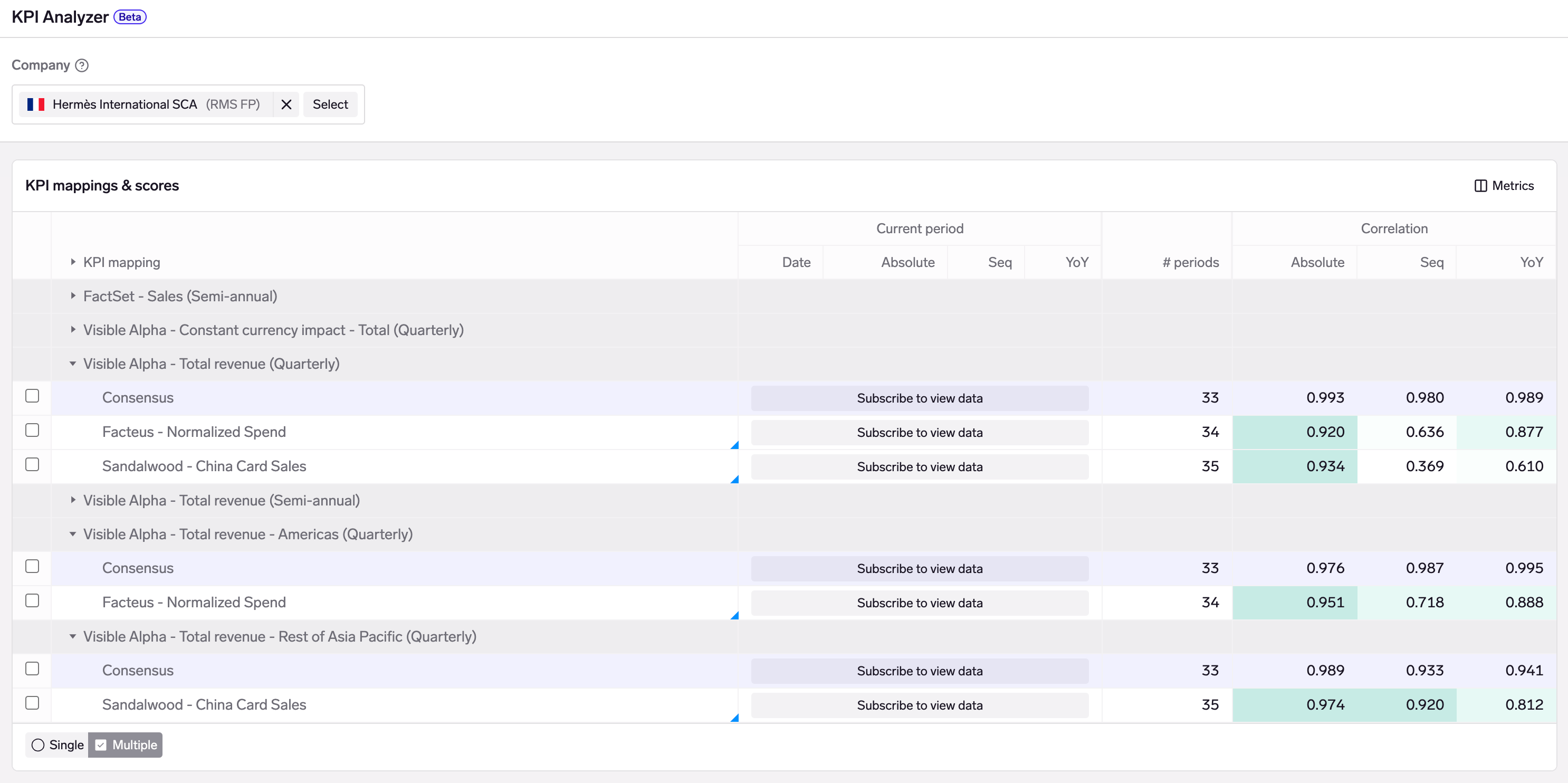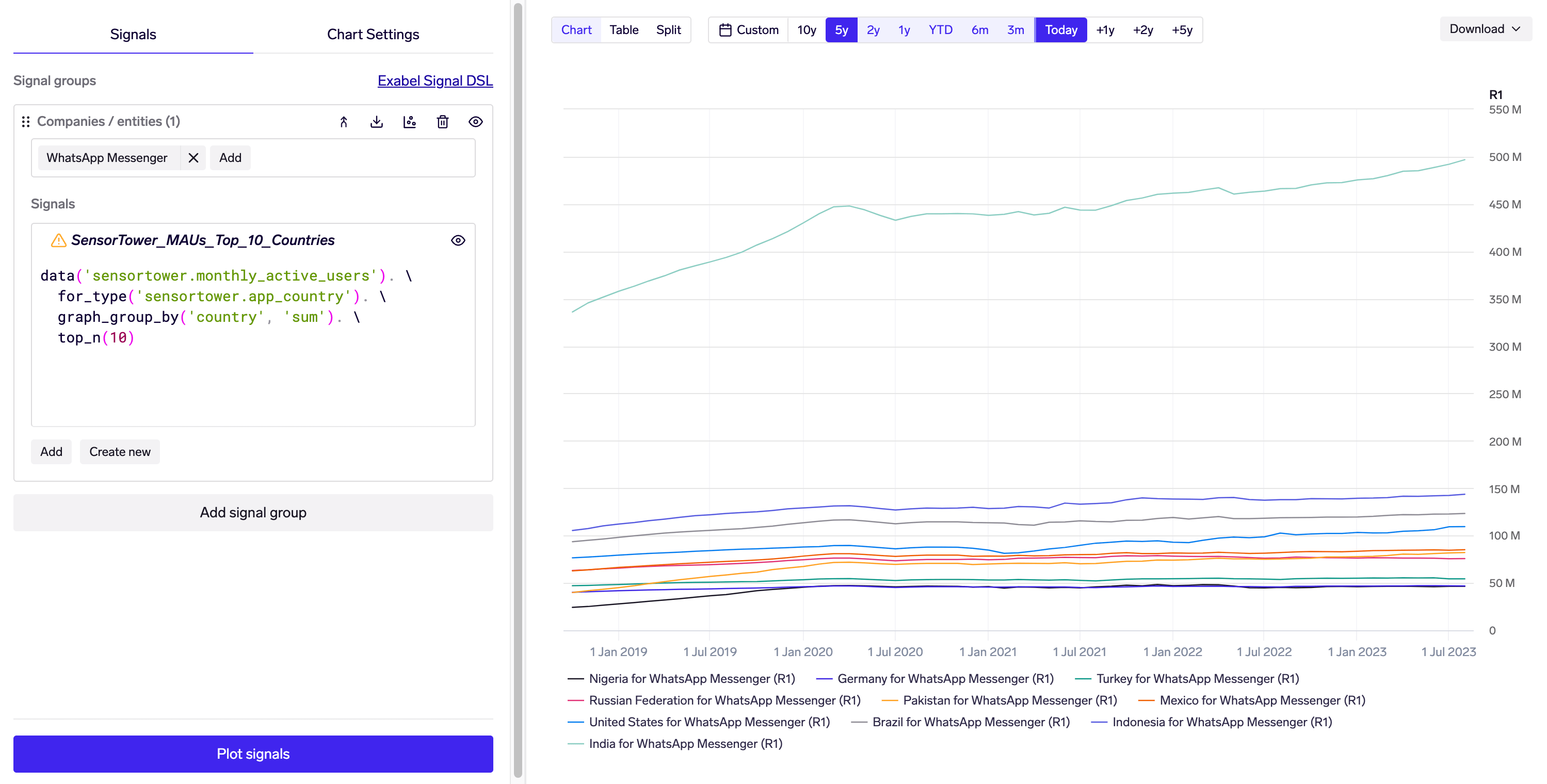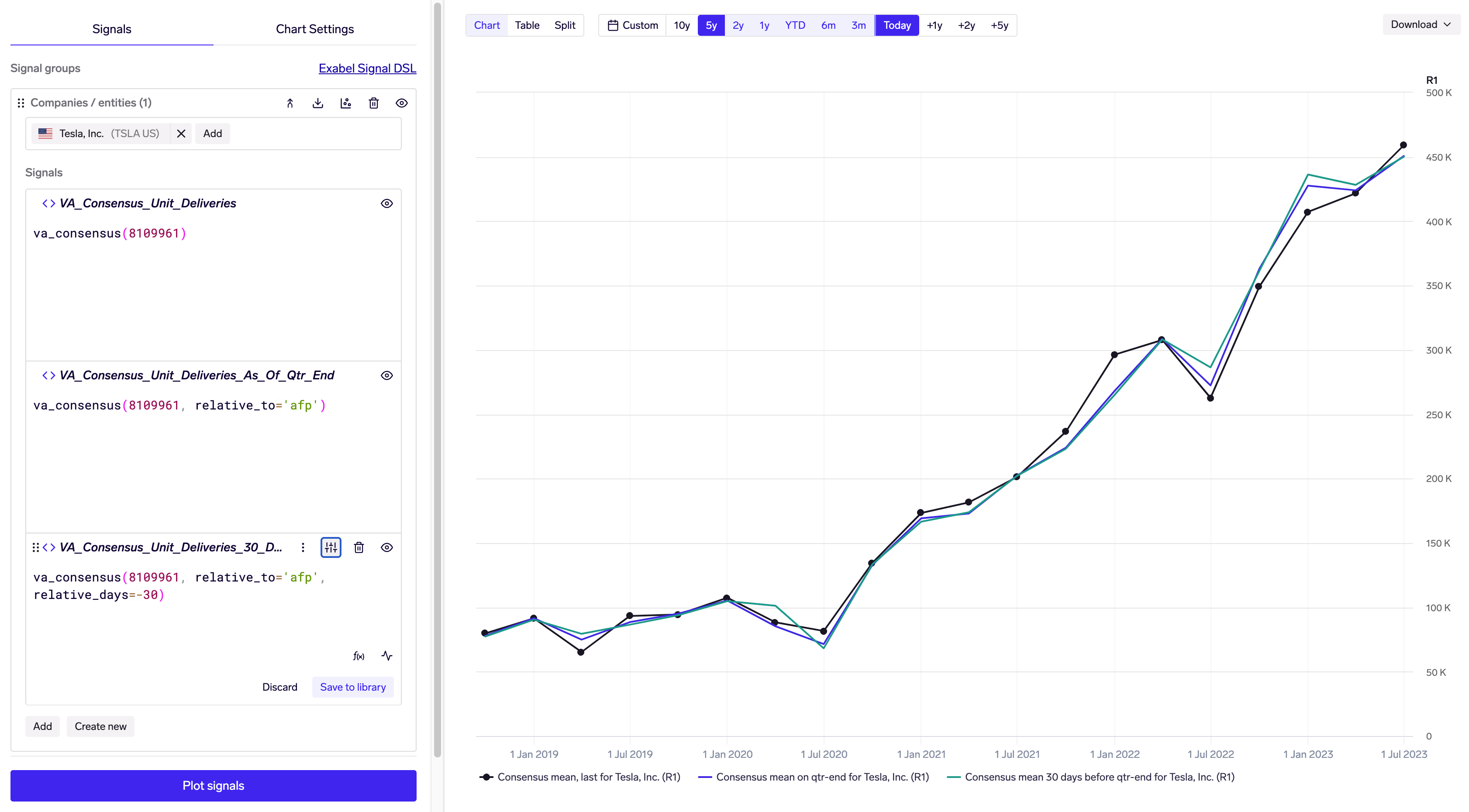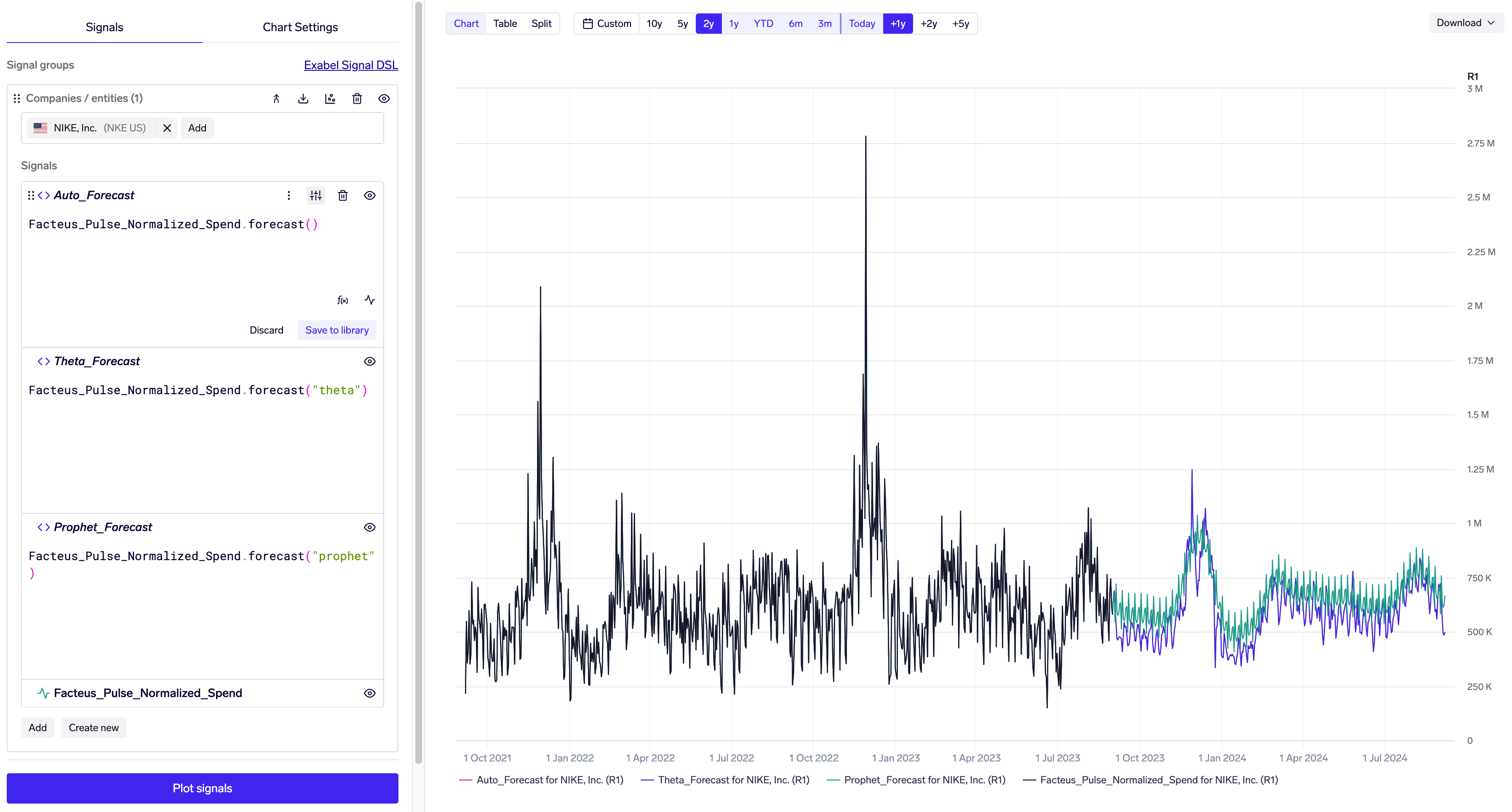August 2023 update
New KPI Analyzer & Mapper features for analyzing company KPIs and doing KPI mapping; DSL improvements for time series selection, Visible Alpha & forecasting; and other improvements & fixes.
New features
KPI Analyzer & Mapper
We've released a new KPI Analyzer feature for analyzing company KPIs with your alternative data signals, currently in an open-beta. This relies on KPI mappings created in a companion KPI Mapper feature, currently in closed-beta. As part of this work, we are working with our data vendor partners to create curated KPI mappings on their data. Buy-side users can also customize their own KPI mappings to vendor data or their own uploaded data - please reach out to [email protected] to learn more.

Analyzing KPIs for Hermès, where vendor alternative data has been mapped to the most relevant KPIs. Showing data sets from Facteus Pulse (US card data) and Sandalwood China card data.
As of today, 2 of our data partners, Facteus (US card data) & Sandalwood (China/Korea card & e-commerce data) have made their KPI mappings available to all Exabel buy-side subscribers (access to their data still requires a license from either vendor, as shown in the screenshot above).
Coming soonMore data vendors with more curated KPI mappings
Training prediction models from KPI mappings, directly in the KPI Analyzer
Integrating KPI analysis results on dashboards
DSL improvements
Top/bottom time series: We've added new top_n(n) and bottom_n(n) functions for selecting the top and bottom time series from a signal, which is useful when a signal can return many time series. For example, if you have a signal that returns mobile app monthly active users per country, this allows you to filter for the top countries. (DSL documentation)

Using top_n() to filter for the top 10 countries in terms of MAUs for WhatsApp, in Sensor Tower data.
Visible Alpha relative consensus: We've added optional relative_to and relative_days parameters to the va_consensus() and va_metric() functions. This allows for the retrieval of historical consensus estimates on dates relative to the period-end date or results publication date for each historical period. (DSL documentation)

Visible Alpha consensus for Tesla unit deliveries, as of the last revision pre-reporting (black), as of quarter-end (blue), and as of 30 days before quarter-end (green).
"Auto" forecasting: We've added a new default "auto" model option for univariate forecasting with forecast(). This is intended to give a reasonable forecast in most situations, and gives the same result as a Theta model, but is subject to change if Exabel finds a better model.
This is backwards-compatible as forecast() previously required specifying the model type; any such signals are unaffected. (DSL documentation)

Forecasting daily card spend from Facteus. If no model is specified, we default to the "auto" model (Theta). The Theta model, if explicitly specified, produces the same result. The Prophet model is shown for comparison.
Improvements
- Data Explorer: Keep the selected data set and any applied filters in the browser URL, so that it is possible to bookmark and share links to a particular view in Data Explorer.
- Data Explorer: Faster search for companies in a data set, and support for searching companies by ticker or ISIN.
- Data Explorer: End-users can request an update of the data model for a data set. Use this if data was recently uploaded to a data set, but is missing in Data Explorer. Note: we are continuing to add better support for automatically updating Data Explorer when data is uploaded or deleted, but this manual update may be needed in some cases. Requested updates will be placed in a queue, and will usually start being processed in minutes.
- Company/entity/tag selector: re-designed user interface with more compact grouping of entities by data set. FactSet sector tags are now organized under the "Tags" section.
- DSL: For univariate forecasting with
forecast(), changed the default seasonality period for Theta forecasting models for daily time series from 7 to 365. We have found that this generally leads to better forecasts as the model better captures yearly seasonality. - DSL: Allow cross-sectional analysis for Visible Alpha signals.
- DSL: Add support for evaluating
model_backtests()without any entity if the prediction model is on a global signal. - Exabel APIs: End-users with the customer administrator role can retrieve your Exabel API key from the account settings page. Please reach out to [email protected] for help in setting this up.
Bug fixes
- Charts: Fixed "auto" suffixing on y-axes not working when decimal places are specified.
- Prediction models: Fixed a bug preventing UI download of prediction models results for global signals (when there is no target entity).
- Prediction models: Use the correct backtest configuration when a run is triggered through the API/SDK.
- DSL: Fixed bug where, when a company calendar could not be calculated, the Visible Alpha signals would not produce data for the observed dates in the last fiscal year.
- DSL: Fixed a bug in the
delay()function where values could get dropped if data points for different entities and different dates were delayed and landed on the same date. This would happen if for example two companies had values on dates Dec. 31st and Dec. 30th, and these values were delayed by evaluating signal.delay(months=2). Both values should have ended up on Feb. 28th, but the bug caused one of the values to be dropped. This would happen if the signal was evaluated for multiple entities at the same time, such as in dashboard tables, or alpha tests, but not in pop-up charts or most drill-downs. - Data API: Fixed a bug where, in some cases, a value would not be written correctly to storage. Identified cases where this would happen: a) a range of values were written, and b) consecutive versions of a timestamp was written with the same value, and c) a previous value existed at some of those timestamps